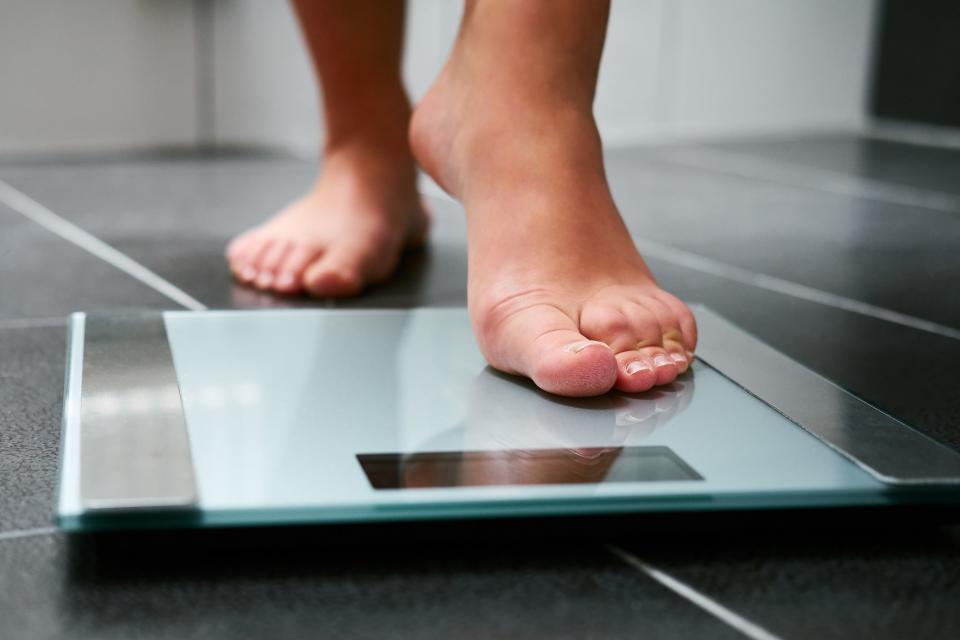Boston Woman Says She's Disabled After Doctors Misdiagnosed Her Pain as Weight-Related
MaryAnn Dakkak’s leg pain was chalked up to obesity until a doctor friend discovered the real cause

Getty
A patient's weight can often lead to a misdiagnosisA Boston doctor is speaking out about bias in the medical community against overweight and obese patients after her own pain was misdiagnosed — to the point where she nearly lost use of her leg.
Dr. MaryAnn Dakkak struggled with sciatica — radiating nerve pain down her leg — after the birth of her third child.
“I had gone to the emergency room, had felt very dismissed. Nobody examined my leg. Nobody touched my back,” she told TODAY.com. “It was very much, ‘So you just had a baby. Sciatica [is common].’”
But Dakkak’s pain escalated, making her left leg difficult to lift. She had hip pain. Her 10-year-old had to help her get dressed.

Getty Images/iStockphoto
Weight can often lead to a patient being misdiagnosedAs a doctor, Dakkak knew that her obesity couldn’t medically be a factor in her pain, so she reached out to friends and colleagues for help.
“My friend … tested my reflexes and I had no reflexes in my left leg,” Dakkak says. “[My friend] was like ‘What were you thinking? No obesity causes you to be unable to lift your left leg.’”
The diagnosis? A herniated disc that “cut off my nerve root” — an injury so severe, it would have led to Dakkak losing the use of her leg had it not been treated.
Related: P.K. Subban Slammed for 'Horrible' Body-Shaming Joke About Lizzo During NHL Playoffs
“Luckily, because I know so many doctors, I was able to cobble together my own care team fairly quickly,” she told Today.com. “One of my clinicians told me, ‘Oh my gosh, if you hadn’t advocated for yourself, you would have been permanently in a wheelchair.’ I would have been permanently unable to use my left leg.”
Dakkak was fortunate to have a network of doctors to rely on — but not every patient is so lucky. That’s part of what inspired her to write about her experience for an essay called “Fat Shame—Inside and Out“ in the Journal of the American Medical Association (JAMA).
In her essay, Dakkak implores doctors to look past their own prejudices towards overweight and obese patients — prejudices that often lead to them being misdiagnosed, as she was, or to avoid seeking medical care altogether.
“The data on medical stigma of obesity are damning. A survey of medical students published in 2018 reported that 74% thought obesity resulted from ignorance, and 28% thought people with obesity are lazy,” Dakkak wrote.
“Similar surveys of outpatient physicians suggest that about half hold obesity biases, and many feel unprepared to counsel and/or treat obesity. Furthermore, patients with obesity are more likely to delay or defer health care visits.”
In a recent TikTok, Dakkak acknowledges that obesity can and does lead to health problems. But, she advises, “instead of using obesity as kind of a punitive word, use it as what it is. It’s a risk factor,” she said. “It is pathologically important. It contributes to diabetes, hypertension, and many things.”
She also cautions that it’s important to pay attention to why people gain weight. “People didn’t become obese because they ate too much ice cream. That’s a lie. They didn’t become obese because of their choice. They didn’t become obese because they don’t know how to eat healthy or they’re too lazy. Those are all stigmas that are actually based in lies. People become obese for multiple reasons, many of which have to do with genetics and public health, and we are gonna have to treat patients as full humans and respect them as such.”
And while her surgery was successful, the delays in medical treatment have caused Dakkak to still struggle with pain.
“Two years after my visit to the emergency department, I remain an obese, mildly disabled physician,” she wrote in JAMA. “My left leg will always be weaker than my right.”
But as a faculty member at the Boston University School of Medicine, Dakkak writes part of her job is helping students learn to overcome the stigmas that she faced.
“Creating and promoting a curriculum focused on understanding and disarming our learned biases are necessary to provide the best care to all patients, regardless of size.”
For more People news, make sure to sign up for our newsletter!
Read the original article on People.

